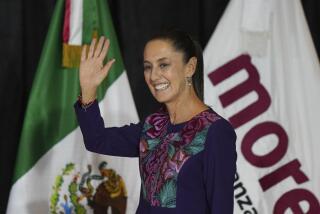Reagan Calls for Philippine Unity : Rivals Asked to Work Together, Seek Stability
- Share via
WASHINGTON — President Reagan pleaded Monday for national reconciliation in the Philippines to prevent Communist insurgents from capitalizing on public outrage over last week’s fraud-ridden election.
He called on President Ferdinand E. Marcos and opposition candidate Corazon Aquino to “come together to make sure the government works.”
Talking to a group of regional editors and broadcast executives at the White House, Reagan said that Friday’s election, “in spite of all these charges” of vote theft and other abuses, is “evidence of a strong two-party system now in the islands.”
Best Face Possible
Faced with the prospect of increased turmoil and instability in a region considered vital to U.S. security, Reagan and other Administration officials sought to put the best face possible on the chaotic contest, which seemed to be so marred by fraud that doubts about the outcome will probably never be reconciled.
U.S. officials privately had said before the balloting that “the worst case” possible would be for Marcos to win an election that was perceived as stolen.
Reagan and other officials who discussed the election in public Monday insisted that the results are not yet official and that it is impossible to determine who won.
However, it is understood that Washington believes Marcos ultimately will be declared the winner, despite evidence suggesting that Aquino would have won if there had been an honest count.
White House Deputy Press Secretary Larry Speakes and State Department spokesman Charles Redman echoed Reagan’s call for a rapprochement between Marcos and Aquino, but neither would speculate on how the two could begin to cooperate after the bitter, frequently violent campaign.
The Administration is known to hope that Marcos will extend an olive branch to his opponent to appease world public opinion and U.S. concern, to head off threatened violent demonstrations and to avoid a cutback in U.S. aid. Similarly, the Administration hopes that Aquino will agree to work for reforms within the government.
As long as the odds appear for such a reconciliation, there seems to be no other solution, in the Administration view, that would protect the strategically vital U.S. leases on Clark Air Base and Subic Bay Naval Base and also prevent the Communist New People’s Army from taking advantage of the situation.
Irreplaceable Bases
The bases are the largest U.S. military facilities outside of the United States, and the Pentagon considers them irreplaceable.
Marcos has suggested that he might attempt to end the U.S. presence if Washington meddles in Philippine politics. Also, before the election, Administration officials warned that the New People’s Army was gaining in strength and would pose a threat to the government unless the Manila government institutes significant reforms.
Vice President George Bush summed up the situation after the balloting: “I have seen many, many reports of fraud. There appears to be a considerable amount of fraud and abuse. We are very much concerned about the fraud. We are (also) very much concerned about the insurrection of the Marxists.”
Speakes said: “There is obvious enthusiasm for the electoral process on the part of the Filipino citizens, and the basis exists for a strong two-party system.
“Only one element of the Philippine society boycotted the election, the Communists. . . . It is clear that the Filipinos (who voted) and the Communists have a very different agenda for the future of their country.
Fraud Reports ‘Regretted’
Speakes and Redman both said that the Administration “regretted” the reports of fraud and intimidation of voters, but neither spokesman would go as far as Sen. Richard G. Lugar (R-Ind.), chairman of the Senate Foreign Relations Committee and head of a U.S. delegation named by the White House to observe the elections.
Lugar said before leaving Manila that there is “a good possibility” that the election results are being manipulated. And he seemed to put the blame on Marcos when he said that “those who are in authority perhaps bear the heaviest responsibility.”
The delegation arrived back in Washington late Monday, and Lugar said: “Tonight we are going to compose our best thoughts for the President and visit with him” this morning.
Redman said Lugar’s report will be “one of the factors in our assessment.” But he said that other factors also will be considered, possibly signaling that the Administration view will be less critical than Lugar’s.
Aid in Doubt
Before the election, Reagan had said that the United States would consider substantial increases in foreign aid to the Philippines if the election were free and fair. Administration officials said that now seems to be out of the question.
It is understood, however, that the Administration has ruled out any punitive cuts in foreign aid. Reagan requested $224.5 million in economic and military aid for Manila during the fiscal year that begins Oct. 1.
However, the Administration may find it impossible to defend that aid figure in Congress.
Congressional leaders have been much harsher than Administration officials in their criticism of the Philippine election. And the lawmakers, anxious to find places to cut the budget to meet deficit-reduction targets, are expected to give all foreign aid requests tough scrutiny this year.
More to Read
Sign up for Essential California
The most important California stories and recommendations in your inbox every morning.
You may occasionally receive promotional content from the Los Angeles Times.












